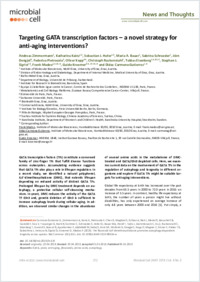Targeting GATA transcription factors – a novel strategy for anti-aging interventions?
- Zimmermann, Andreas Institute of Molecular Biosciences, NAWI Graz, University of Graz, Austria.
- Kainz, Katharina Institute of Molecular Biosciences, NAWI Graz, University of Graz, Austria. - Division of Endocrinology and Diabetology, Department of Internal Medicine, Medical University of Graz, Austria.
- Hofer, Sebastian J. Institute of Molecular Biosciences, NAWI Graz, University of Graz, Austria. - BioTechMed Graz, Austria.
- Bauer, Maria A. Institute of Molecular Biosciences, NAWI Graz, University of Graz, Austria.
- Schroeder, Sabrina Institute of Molecular Biosciences, NAWI Graz, University of Graz, Austria.
- Dengjel, Jörn Department of Biology, Université de Fribourg, Switzerland.
- Pietrocola, Federico Institute for Research in Biomedicine
- Kepp, Oliver Equipe 11 labellisée Ligue contre le Cancer, Centre de Recherche des Cordeliers , INSERM U 1138, Paris, France. - Metabolomics and Cell Biology Platforms, Gustave Roussy Comprehensive Cancer Center, Villejuif, France. - 8Université de Paris, France. - Sorbonne Université, Paris, France.
- Ruckenstuhl, Christoph Institute of Molecular Biosciences, NAWI Graz, University of Graz, Austria.
- Eisenberg, Tobias Institute of Molecular Biosciences, NAWI Graz, University of Graz, Austria. - BioTechMed Graz, Austria. - BioHealth Graz, Austria. - Central Lab Gracia, NAWI Graz, University of Graz, Austria.
- Sigrist, Stephan J. Institute for Biology/Genetics, Freie Universität Berlin, Germany.
- Madeo, Frank Institute of Molecular Biosciences, NAWI Graz, University of Graz, Austria. - BioTechMed Graz, Austria. - BioHealth Graz, Austria.
- Kroemer, Guido Equipe 11 labellisée Ligue contre le Cancer, Centre de Recherche des Cordeliers , INSERM U 1138, Paris, France. - Metabolomics and Cell Biology Platforms, Gustave Roussy Comprehensive Cancer Center, Villejuif, France. - 8Université de Paris, France. - Sorbonne Université, Paris, France. - Pôle de Biologie, Hôpital Européen Georges Pompidou, Paris, France. - Suzhou Institute for Systems Biology, Chinese Academy of Sciences, Suzhou, China. - Karolinska Institute, Department of Women’s and Children’s Health, Karolinska University Hospital, Stockholm, Sweden.
- Carmona-Gutierrez, Didac Institute of Molecular Biosciences, NAWI Graz, University of Graz, Austria.
-
05.06.2019
Published in:
- Microbial Cell. - 2019, vol. 6, no. 5, p. 212–216
English
GATA transcription factors (TFs) constitute a conserved family of zinc-finger TFs that fulfill diverse functions across eukaryotes. Accumulating evidence suggests that GATA TFs also play a role in lifespan regulation. In a recent study, we identified a natural polyphenol, 4,4’-dimethoxychalcone (DMC), that extends lifespan depending on reduced activity of distinct GATA TFs. Prolonged lifespan by DMC treatment depends on autophagy, a protective cellular self-cleansing mechanism. In yeast, DMC reduces the activity of the GATA TF Gln3 and, genetic deletion of Gln3 is sufficient to increase autophagy levels during cellular aging. In addition, we observed similar changes in the abundance of several amino acids in the metabolome of DMC-treated and GATA/Gln3 depleted cells. Here, we examine current data on the involvement of GATA TFs in the regulation of autophagy and longevity in different organisms and explore if GATA TFs might be suitable targets for anti-aging interventions.
- Faculty
- Faculté des sciences et de médecine
- Department
- Département de Biologie
- Language
-
- English
- Classification
- Biological sciences
- License
- License undefined
- Identifiers
-
- RERO DOC 326707
- DOI 10.15698/mic2019.05.676
- Persistent URL
- https://folia.unifr.ch/unifr/documents/307885
Statistics
Document views: 86
File downloads:
- den_tgt.pdf: 108
